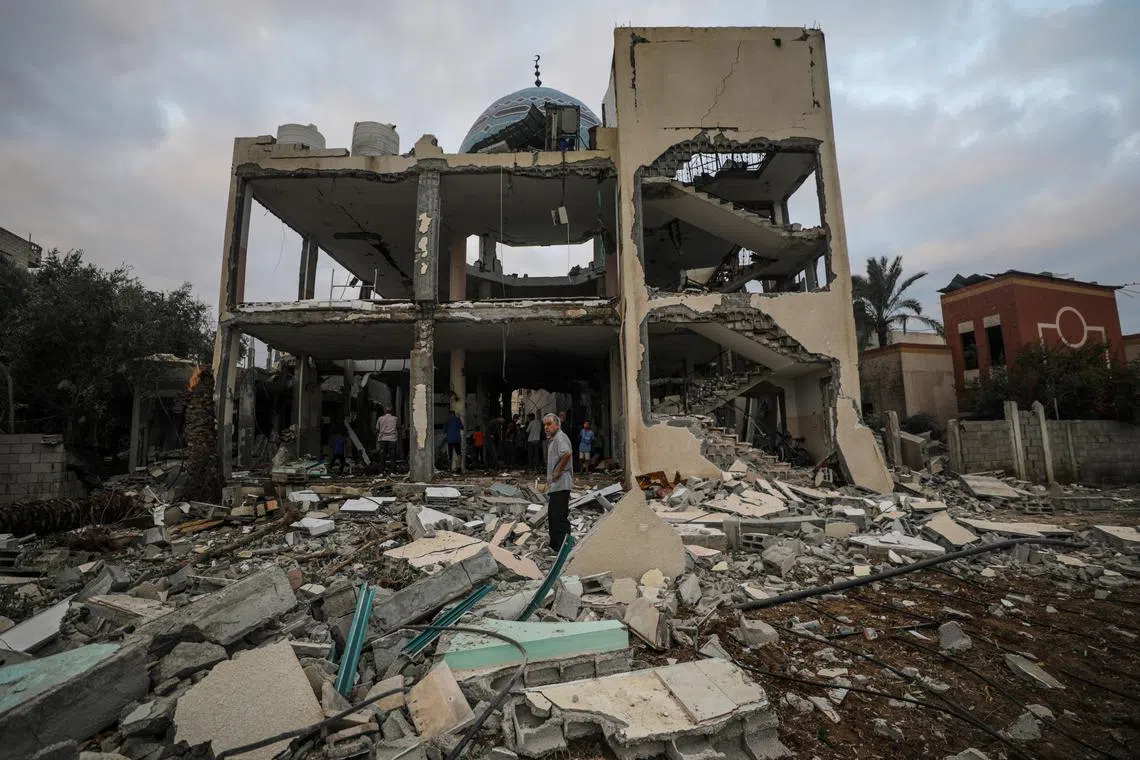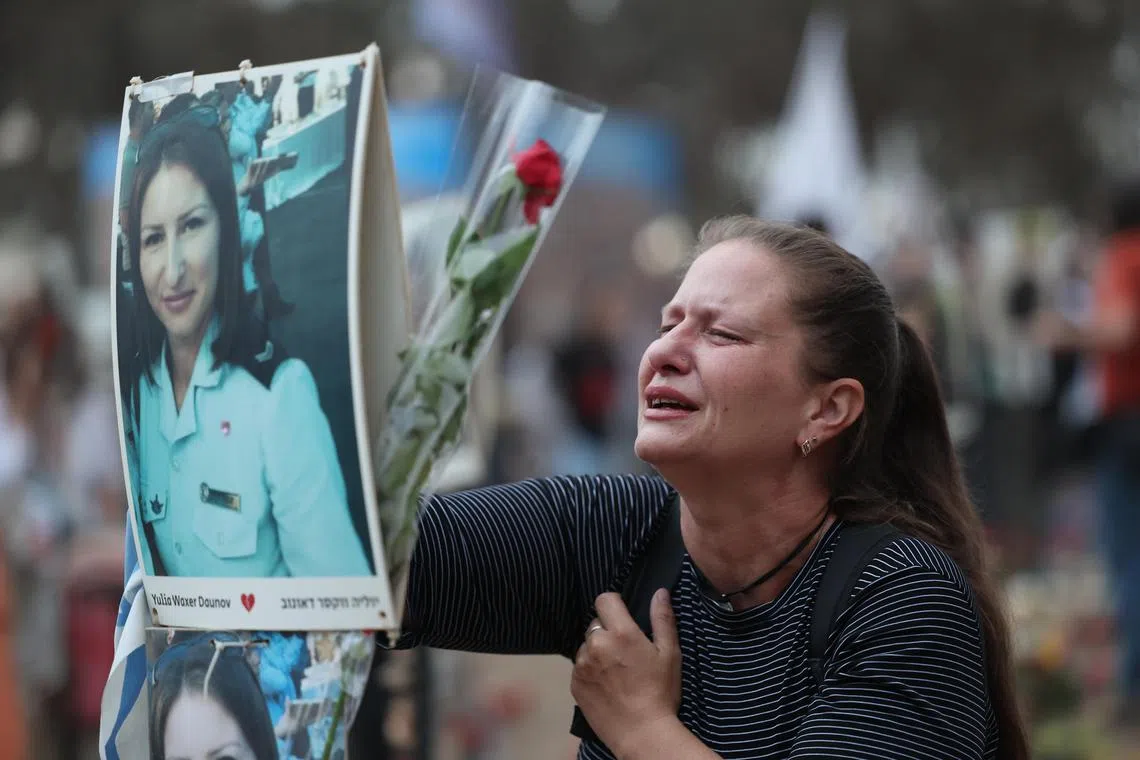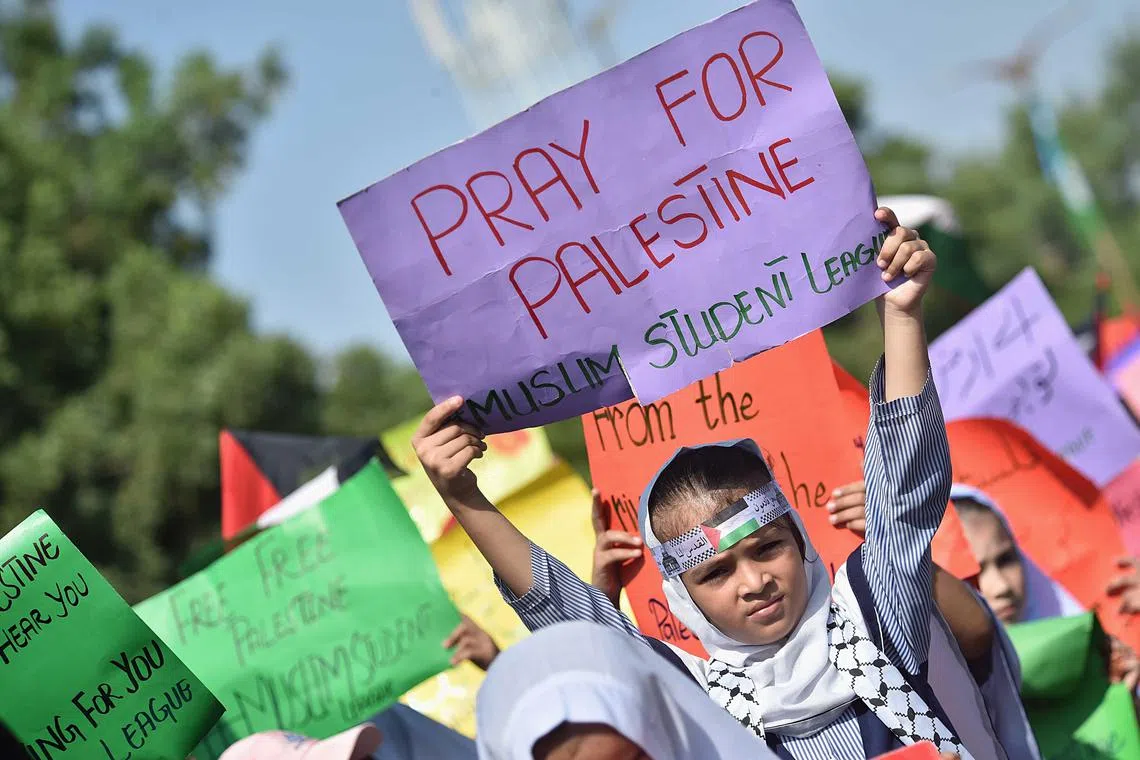A year after Oct 7 attack: Israelis and Palestinians reflect on loss as war grinds on
Sign up now: Get ST's newsletters delivered to your inbox
REIM, Israel – Israel held solemn memorials against the backdrop of continued fighting on the first anniversary of the deadliest day in the country’s history – the Hamas-led attack on Oct 7, 2023, which is now spiralling into a far wider conflict in the Middle East.
Israel’s enemies – Iran-backed militant groups Hamas and Hezbollah – marked the day by raining rockets across Israel, with some slipping past air defence systems and slamming into buildings and homes.
The anniversary caps 12 months of profound loss and trauma for both Israelis and Palestinians.
On Oct 7, 2023, Hamas militants broke through the border from Gaza into southern Israel
Hours after that attack, the Israeli military tore across Gaza. In the 12 months since then, it has reduced large swathes of the enclave to rubble. That relentless offensive against Gaza has so far killed close to 42,000 Palestinians.
Israel’s President Isaac Herzog began the Oct 7 commemoration with a moment of silence at 6.29am local time (11.29am in Singapore) – the exact time of the attacks – at Kibbutz Reim in northern Israel, the site of a music festival where hundreds were killed by Hamas
Songs and prayers were accompanied by the resounding booms and sharp cracks of Israeli strikes just across the border in Gaza.
The organisers – family members of those killed – had planned to sound a siren for a minute, but the security authorities asked them not to, as they feared the crowd would confuse it for a warning of incoming rocket fire.
Instead, at 6.29am, after hearing the track that the crowd was dancing to a year ago when the assault began, the hundreds who had gathered stood for a minute of silence to mark the moment. It was broken by a bereaved mother’s piercing cries.
Among those mourning their loved ones were Mr Michael Marlowe and his wife Lisa from England. Their son, Mr Jake Aaron Marlowe, 26, had moved to Israel and was working as part of an unarmed security team at the festival when he was killed.
He was shot nine times, his father said. When asked what he does in life, Mr Marlowe replied: “I grieve constantly now.”
In Tel Aviv, the families of hostages and their supporters rallied before dawn to call for the return of their loved ones.
They have spent 12 months in a kind of suspended animation. They have spoken at rallies and met Prime Minister Benjamin Netanyahu, American officials and even Hollywood celebrities eager to show their support.
“It is a horrible feeling to meet these people who have major influence all over the world and not get our family back,” Mr Tomer Keshet said. He is a cousin of Mr Yarden Bibas, whose family became instantly known last October after images of his wife, Shiri, and red-haired children, three-year-old Ariel and nine-month-old Kfir, being kidnapped during the Hamas-led attack were widely shared online
Unparalleled loss
Palestinians in Gaza, on the other hand, are looking back on a year of unparalleled loss: homes destroyed, livelihoods upended, relationships interrupted and loved ones killed.
None of the more than two million people in the territory has been unaffected.
“We were so happy before this war,” said Ms Maisaa al-Naffar, 20, recalling her first few weeks as a newlywed in 2023. She added: “I am not the person I used to be.”
For Mr Abu Kheir, the image from the war that lingers is that of a naked, lifeless woman lying in the street, blown out of a house that had been bombarded.
The conflict has killed two of his best friends, and displaced him and his family, he said. It also destroyed the apartment he was building in the southern Gaza city of Rafah.
The war, he said, has “destroyed my dreams”.
Mr Jehad Abu Hatab, a 35-year-old father of four originally from Khan Younis in southern Gaza, said the most difficult part of the past year has been the constant displacement.
His youngest son, Siraj, was born just two weeks into the war. Repeated evacuation orders have driven them from one place to another – seven times in all, he said, with no hope of returning home soon.
“This year has turned us into bodies without souls,” Mr Abu Hatab said. “We just tasted all different types of suffering and hardship.”

The destroyed Al Aqsa Martyrs Mosque following an Israeli air strike on Deir Al Balah in the central Gaza Strip on Oct 6.
PHOTO: EPA-EFE
Taking sides
Tens of thousands, meanwhile, attended events in cities around the world
In London on Oct 6, thousands gathered in Hyde Park, waving Israeli flags and “bring them home” placards with the faces of the hostages.
The day before, a “National March for Palestine” in the city saw chants of “stop bombing civilians” and “hands off Lebanon”.
In Berlin, a pro-Israel demonstration near the city’s Brandenburg Gate on Oct 6 drew around 500 people. Many waved the Israeli flag and some carried pictures of hostages held by Hamas.
Over a thousand people, meanwhile, marched in solidarity with Palestinians in the same city, with demonstrators chanting, “Gaza, you are not alone”.

A family member gathered with others near Kibbutz Re’im, close to the border with the Gaza Strip, on Oct 7 to remember Israelis killed by Hamas exactly a year ago at a music festival.
PHOTO: EPA-EFE
US President Biden offered a full-throated defence of Israel on Oct 7.
Condemning the “unspeakable brutality” of Hamas’ attack on Israel, Mr Biden said in a statement that he was committed to Israel’s security and supported its right to self-defence.
But he also acknowledged the civilian death toll wrought by the war, the tens of thousands killed in Gaza.
“Far too many civilians have suffered far too much during this year of conflict – and tens of thousands have been killed,” he said.
Britain’s Prime Minister Keir Starmer focused on the plight of the hostages.
“One year on from these horrific attacks, we must unequivocally stand with the Jewish community and unite as a country,” he said in a statement. “We must never look the other way in the face of hate.”
President Emmanuel Macron of France said the pain of Oct 7 remained “as vivid as it was a year ago”, in a post on X. “The pain of the Israeli people. Ours. The pain of wounded humanity.”
Pope Francis slammed the “shameful inability” of world powers to end the conflict in the Middle East.
“A year ago, the fuse of hatred was lit; it did not sputter, but exploded in a spiral of violence, in the shameful inability of the international community and the most powerful countries to silence the weapons and put an end to the tragedy of war,” he said in an open letter to Catholics in the Middle East.

Protesters at a rally on Oct 7 in support of the Palestinian people in Karachi, Pakistan.
PHOTO: EPA-EFE
No end in sight
A year on, all signs point to the war in Gaza not just grinding on but escalating into a “new phase”.
Mr Netanyahu said on Oct 7 that Israel was changing the security reality in the region to ensure an attack like that of Hamas would not happen again.
“We are changing the security reality in our region; for the sake of our children, for the sake of our future, to ensure that what happened on the seventh of October will not happen again. Never again,” he said in a Cabinet address.
Israel bombed targets in Gaza and Lebanon
Its warplanes dropped bombs once more on Beirut’s southern suburbs, where Hezbollah is headquartered.
Israel’s military said it had struck the group’s arms storage facilities in these suburbs.
There were also air strikes on Hezbollah targets in southern Lebanon and the Bekaa Valley in the east, it said.
Lebanon’s Health Ministry said 10 firefighters were killed in an air strike on a municipal building in the town of Bint Jbeil.
In Gaza, the Israeli military announced that it had again surrounded Jabaliya, in one of its first major ground operations in the enclave in weeks.
In response, Hezbollah fired rockets at Israel’s third-largest city
It said it targeted a military base south of Haifa with a salvo of ballistic missiles and mounted a separate attack on Tiberias 65km away.
Israel’s military said in a statement that five rockets were launched at Haifa from Lebanon.
“Interceptors were fired. Fallen projectiles were identified in the area. The incident is under review.” it said.
It said 15 other rockets were fired inland at Tiberias in Israel’s northern Galilee region, some of them intercepted. Israeli media said a further five rockets hit the ground.
Police said some buildings and properties were damaged, and there were reports of minor injuries, with some people taken to a nearby hospital.
Hamas, for its part, fired a barrage of rockets towards Tel Aviv, setting off sirens in central areas of Israel. Security officials in Israel said two people were injured in that salvo.
Brigadier-General Shlomo Brom, a retired senior Israeli officer, said in an interview that the Israeli military had won great tactical successes against Hamas.
The group can no longer muster rocket barrages against Israeli cities, and many of its commanders have been eliminated, he said.
But obliterating Hamas was not a realistic definition of victory. Without a more achievable goal, Israeli soldiers could be stuck fighting in Gaza indefinitely, he said.
“There’s a kind of trap: We go into a given area and clear it of Hamas, but it’s impossible to do so entirely,” he said.
“And then they’ll return to other areas, and we’ll have to go back as well to clear them again.”
NYTIMES, REUTERS, AFP


